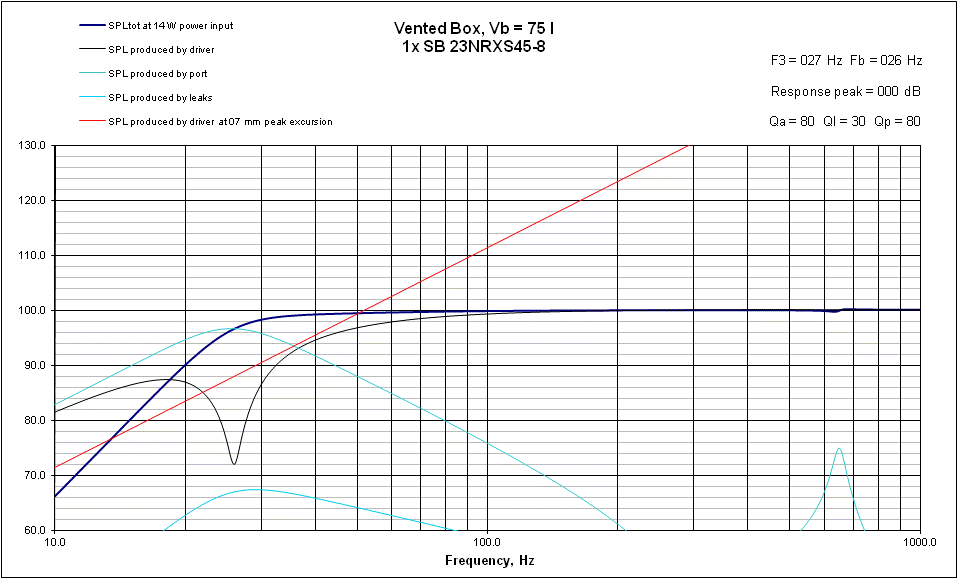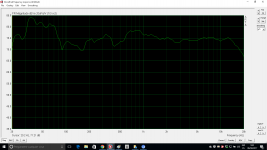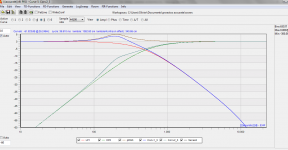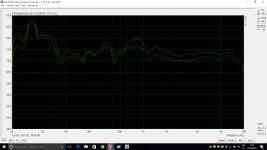From arta manual:
http://www.artalabs.hr/download/ARTA-user-manual.pdf
By using the Farina method [7], ARTA can simultaneously estimate the frequency response and levels
of harmonic distortions from the measured PIR. To apply this method, following measurement
conditions have to be fulfilled:
1) The impulse response must be measured with a logarithmic swept-sine excitation (defined in
Section 5.2).
2) The length of the excitation sequence should be 64k or larger.
3) Measurements have to be done in a ‘Single channel mode’, with the check box ‘Center
peak of impulse response’ selected (see Fig. 5.3).
After obtaining impulse response in the PIR window the user has to:
1) put the cursor few samples in front of the peak of the impulse response (but less than 250
samples before the peak), and
2) press keys Shift+F12 or click menu command 'Analysis->Frequency response and
distortion'
ARTA automatically does all necessary calculations and shows results in the window ‘Frequency
Response and Distortions’, shown in Fig. 6.13 and 6.14. Depending of state of the push button
labeled ‘Dist(%)’ it shows level of harmonics (H2, H3, H4) in dB or percentage of distortion (D2, D3,
D4).
What about if when finished the xover I will post *pir file and you do and post the results?
Back again to 20uF on the SS?🙄
20uF SS
Attachments
I agree with Lojzek, this topic has developed into a farce. Endless postings of minor changes to a homebrew lash-up ( certainly not by a speaker designer with ability) and asides from ,perhaps a well wishing individual whose only material is from other sources and a simulator. Moderators where are you ?
The process we are trying to follow is modifiying a standard LR12 around 400 adding the necessary Eq(s) so as to match a target room curve at the listening position.
It does no longer matter at all if the resulting filter matches or not a text book LR xover, nor gives a flat anechoic response, what matters is matching a room target. Hence measurements are done at listening position instead of the classic proceeding.
Of course the classic proceeding is still valid, though might drive you to the further purchase of DSP hardware and software to get the proper final transfer function, but hopefully we will get faster done...

Attachments
20uF SS
It looks better to me, but have no idea if sounds better or worse...😛
I think is not aligned, do you refer if the drivers coils are aligned in the same axis?
Last edited:
No, i mean cabinet volume and tuning frequency if BR.
Sorry first time I dont understand you, yes the BR is frequency tuned with cabinet volume.
For 1 SB 23NRSX45-8:
Vb = 75L
Fb = 26Hz
F3 = 27Hz
F10 = 20Hz
Port inside diameter = 7.65cm (3")
Port Length = 26.86cm
Stuffing = walls covered
xmax is not exceeded until 100dB 1W/1M at about 23Hz.
Port size and Vb can be slightly adjusted if desired. Actually, there any number of different ways to tune this - this is just one.
Port Volume (L) = (pi*r^2*l)/1000, where r = 1/2 the outside port diameter (cm), and l = the length inside the cabinet (cm) (divide by 1000 because 1L = 1000cm^3)
Be sure that Vb of 75L excludes the volumes of the port, driver, bracing, xo's, etc.
Here's what the response looks like:

http://www.diyaudio.com/forums/multi-way/236392-help-3-4-way-loudspeaker-4.html#post3563473
No this one was clear. And it's clear too that when the port is removed room modes are more acceptable.
I meant the SS monitor, wasn't sure if BR or closed. But it does not matter.
I meant the SS monitor, wasn't sure if BR or closed. But it does not matter.
Measurements done SS monitor with BR closed but have BR, do you want that I will open?
BR only when SS + Seas monitor used only as two way.
BR only when SS + Seas monitor used only as two way.
Last edited:
Yellow SS with BR & green SS without BR, SBA phase inverted.
Attachments
Last edited:
Without filter measurements SBA in box.
Nearfield
50 cm
SBA 50 cm
https://www.dropbox.com/s/9lrjj3jkopn75 ... m.pir?dl=0
SBA nearfield
https://www.dropbox.com/s/nqxmme8tztbswin/SBA%20campo%20cercao.pir?dl=0
Nearfield
An externally hosted image should be here but it was not working when we last tested it.
50 cm
An externally hosted image should be here but it was not working when we last tested it.
SBA 50 cm
https://www.dropbox.com/s/9lrjj3jkopn75 ... m.pir?dl=0
SBA nearfield
https://www.dropbox.com/s/nqxmme8tztbswin/SBA%20campo%20cercao.pir?dl=0
Merlin, see that you want to check your xover is ok... or what's wrong with it...
These FR at 50cm will help, but don't expect any serious sim without valid impedance file, not the half guesses i have been using to get by...😎
These FR at 50cm will help, but don't expect any serious sim without valid impedance file, not the half guesses i have been using to get by...😎
Without filter measurements SS in box.
Nearfield
50 cm
SS 50 cm *pir
https://www.dropbox.com/s/m2c8afyv9kfjlks/SS%2050%20cm.pir?dl=0
SS nearfield *pir
https://www.dropbox.com/s/y1febotkio98g53/SS%20campo%20cercao.pir?dl=0
Nearfield
An externally hosted image should be here but it was not working when we last tested it.
50 cm
An externally hosted image should be here but it was not working when we last tested it.
SS 50 cm *pir
https://www.dropbox.com/s/m2c8afyv9kfjlks/SS%2050%20cm.pir?dl=0
SS nearfield *pir
https://www.dropbox.com/s/y1febotkio98g53/SS%20campo%20cercao.pir?dl=0
- Status
- Not open for further replies.
- Home
- Loudspeakers
- Multi-Way
- Xover to filter woofer SB 23NRSX45-8


